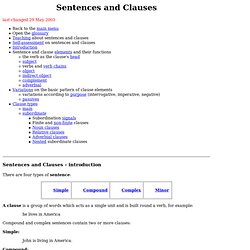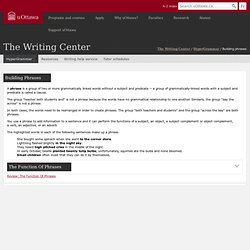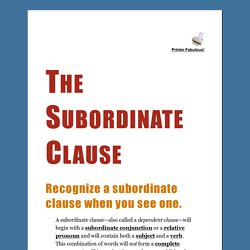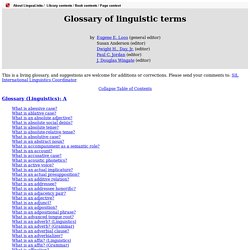

Resolve to Be a More Productive Writer (Happy New Year) Section I - Useful Phrases. Learn Your Damn Homophones. Frequently Asked Questions. English Grammar: Types of Phrases « LearningNerd. Sentence and clause. Last changed 29 May 2003 Sentences and Clauses - introduction There are four types of sentence: A clause is a group of words which acts as a single unit and is built round a verb, for example: Compound and complex sentences contain two or more clauses: Simple: John is living in America.

Compound: He lives in America, but his family is still in Wales. Complex: While his family is still in Wales, John’s staying with friends. Minor: A minor sentence is one without a verb, e.g: First, a word about sentences. To produce varied, interesting writing with effective changes in rhythm, pupils need to be able to use a variety of sentence types. Sentence and clause elements and their functions Simple sentences and main clauses almost always have a subject and a verb, and sometimes have an object: More complex clauses may also have: Verbs as heads of clauses The verb is the most important word in the sentence because it is essential, whereas the subject may sometimes be missed out (for example, in imperatives): The Function Of Phrases. A phrase may function as a verb, noun, an adverb, or an adjective.

Verb Phrases A verb phrase consists of a verb, its direct and/or indirect objects, and any adverb, adverb phrases, or adverb clauses which happen to modify it. The predicate of a clause or sentence is always a verb phrase: Corinne is trying to decide whether she wants to go to medical school or to go to law school. CLAUSES. The Subordinate Clause. Printer Fabulous!

Recognize a subordinate clause when you see one. A subordinate clause—also called a dependent clause—will begin with a subordinate conjunction or a relative pronoun and will contain both a subject and a verb. This combination of words will not form a complete sentence. It will instead make a reader want additional information to finish the thought.
Nouns, Predicate Nominative. Pro1: introduction to pronouns. World Wide Words. Glossary of linguistic terms. Context for this page: Modular book: Glossary of linguistic terms, by Eugene E.

Loos (general editor), Susan Anderson (editor), Dwight H., Day, Jr. (editor), Paul C. Jordan (editor), and J. Douglas Wingate (editor) In bookshelf: Linguistics. 50 Problem Words and Phrases. Online Etymology Dictionary. Mental_floss Blog » Debunking Grammar Myths. This week we're joined by a special guest blogger. Patricia T. O'Conner, a former editor at The New York Times Book Review, is the author of the national best-seller Woe Is I: The Grammarphobe's Guide to Better English in Plain English, as well as other books about language.
She is a regular monthly guest on public radio station WNYC in New York. Learn more at her website, grammarphobia.com. Make her feel welcome! When I think about the rules of grammar I sometimes recall the story—and it's a true one—about a lecture given in the 1950s by an eminent British philosopher of language. Don't we all sometimes feel like that voice from the back of the room? English is not so much a human invention as it is a force of nature, one that endures and flourishes despite our best attempts to ruin it. So when you think about the rules of grammar, try to think like that guy in the back of the room, and never be afraid to challenge what seems silly or useless. Myth #1: Don't Split an Infinitive.